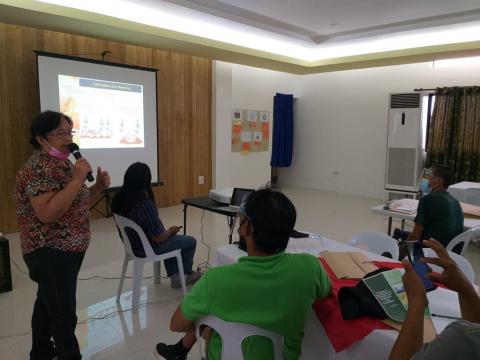Participants engage a discussion with the resource speaker during a lecture
Ubay, Bohol – The National Corn and Cassava Program is one of the banner programs of the Department of Agriculture that aims to increase the production of quality corn and cassava for human consumption, feeds, and industrial uses as well as empower corn and cassava farmers. One of the possible solutions to ensure profit in favor of the farmers is to use or mix local and indigenous ingredients in the feed ration with the integration of natural/organic farming technology.
Hence, on 14 – 16 September 2021, a municipal-based Training on Corn and Cassava Production cum Customized Feed Formulation was conducted in Pacheco's Inn, Poblacion, Ubay, Bohol. Twenty farmers whose farms are based in Ubay, Bohol participated in the three-day training.
Overall, the training aims that the participants should be able to gain knowledge and skills on corn and cassava production and formulate their own feeds for a sustainable agricultural development. In detail, participants learned about corn production and its management, cassava production technology; mycotoxin prevention and control, corn-based farming system and the fall armyworm. They also learned actual feed formulation using various ingredients composition and proportion/customized feed ration.
Marianito M. Doydora, Crispina A. Caballero, and Amalia H. Cutamora, from the Municipal Agriculture Office of Ubay, Bohol; Nilo A. Budiongan from the Office of the Provincial Agriculture in Tagbilaran City, Bohol; and Dr. Roland Villegas from Department of Education in Region VII shared their expertise, while Jonathan O. Sumagang served as a member of the training management team.
The training has an extension support component where participants were provided with 1 kg sweet corn seeds, 1 bag of complete fertilizer, and 1 bag of vermicast fertilizer.
“I learned how to get the crude protein, and the proper planting distance for corn. I will transfer this knowledge to my co-worker. Regarding the training that the ATI RTC 7 conducted, for us, as a farmer, it can help a lot because considering the pandemic situation. As a member of the Board of Directors in our cooperative, I am very proud of what ATI does since this is timely considering our situation nowadays. I am going to re-echo all of my learnings from this training: from climate change to feed formulation, down to cassava production and corn silage process,” said Paul Jovans S. Castillon of San Francisco, Ubay, Bohol – one of the training participants.
Should there be any clarifications or inquiries around this training, you may contact Jeffrey O. Awas, Project Officer, via jeffreyawas@gmail.com.

